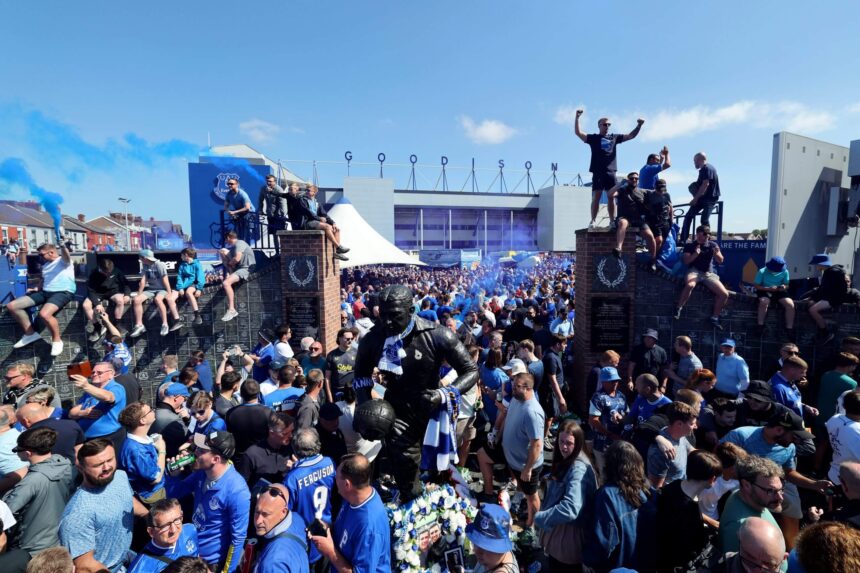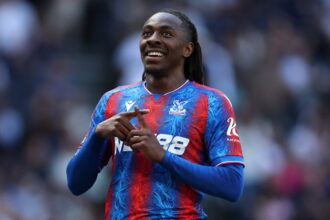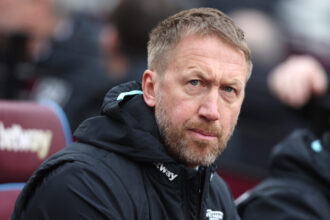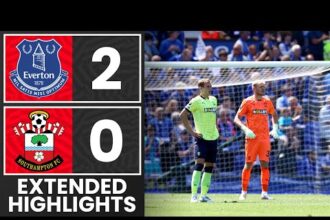Sunday was Anne and John’s final time watching Everton.
“We’re hanging up our scarves,” they said, sitting shoulder to shoulder, basking in the late morning sun that rises above the Gwladys Street End.
John attended his first game at Goodison Park 60 years ago, a 5-1 win against Sheffield Wednesday. In their eighties, they will not be following the club to their new home at Bramley-Moore Dock.
Advertisement
The stands are too steep for Anne, and besides, the drive to Liverpool feels longer every week. Goodison is done, and so are they.
“Things move on,” said John. “We’re excited for the Bramley-Moore — it just won’t be with us.” Will they be calling it the new name?
“We’re just going to ignore that,” they reply. “Who’s come up with the Hickory Dickory Dock?”
On Friday evening, less than 48 hours before their final Premier League game at Goodison, Everton announced they had struck a “long-term” naming rights agreement for their new ground with law firm Hill Dickinson.
“Welcoming Hill Dickinson as our naming rights partner is a bold and strategic step forward,” said the incoming CEO, Angus Kinnear. “This partnership goes beyond branding – it’s a shared commitment to progress, excellence and the regeneration of our city. Hill Dickinson Stadium will stand as a symbol of Everton’s ambitions, our values, and the global future we are building together.”
Though it may now boast 11 offices worldwide, Hill Dickinson was founded in Liverpool back in 1810 — predating Everton by 68 years. Originally specialising in maritime law, it prospered on the city’s docks.
“It brings together two Liverpool institutions, united by a global outlook, a deep commitment to the city of Liverpool, and a shared history that dates back to the very founding of Everton in 1878,” an Everton statement added.
Fans outside Goodison before it hosted its final Premier League match (Richard Heathcote/Getty Images)
Naming rights deals are nothing new. Six Premier League clubs have them, including Arsenal (The Emirates) and Manchester City (The Etihad). Tottenham Hotspur have been searching for a title partner since opening their new stadium in 2019.
Internationally, some of the sport’s most iconic grounds have seen their names changed — from Barcelona’s Spotify Camp Nou to Bayern Munich’s Allianz Arena.
That is not to say they are always popular. Newcastle United fans were furious when former owner Mike Ashley branded St James’ Park as the Sports Direct Arena in 2011. Former England World Cup-winning head coach Clive Woodward accused the Rugby Football Union of “selling its soul” after the board renamed Twickenham Stadium the Allianz Stadium.
Advertisement
But having received points deductions in two of the past three seasons for breaching profit and sustainability regulations, Everton know the importance of generating income.
They say it “represents one of the largest stadium naming rights deals in Europe”, reportedly worth up to £10million ($13.4m) per season. That represents over five per cent of last season’s revenue.
Goodison may still have had one game left to host, but changes were being made to reflect Hill Dickinson’s importance even before kick-off. Behind the rostrum where manager David Moyes was to give his post-match press conference, an Everton staff member was rushing to erect new branding with the law firm’s name.
At half-time of the 2-0 win over Southampton, the PA system reiterated Friday evening’s announcement — Everton were thrilled to announce their new ground would be known as the Hill Dickinson Stadium.
Inside Goodison, the quiet murmur that met that announcement was indicative of a wider mood. Later, during post-match festivities, a group of fans react to the same message by shouting: “The Bramley-Moore!”
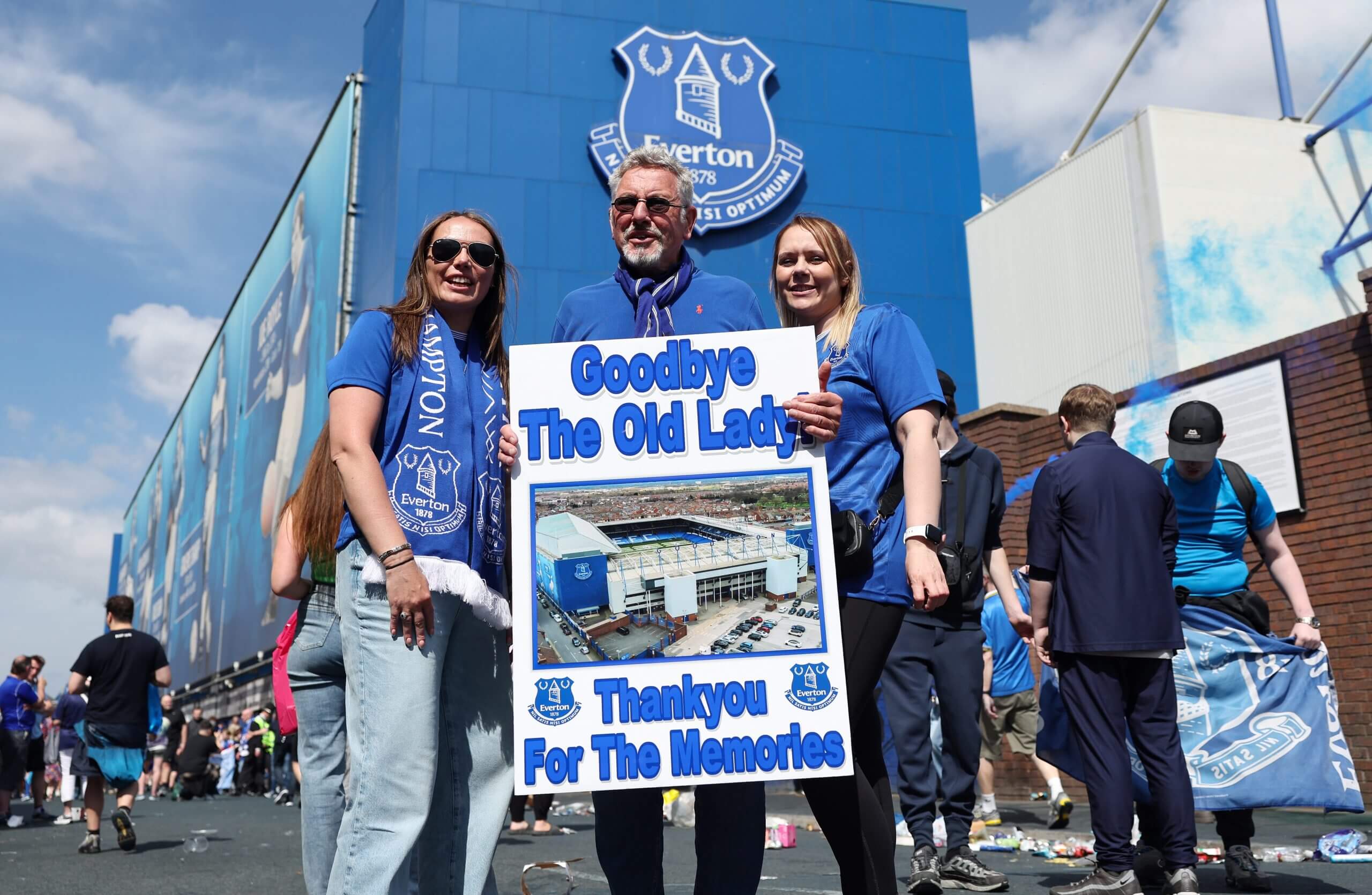
Fans saying goodbye to Goodison (Matt McNulty/Getty Images)
“I’m not keen at all,” Phil, an Everton fan from north Wales, told The Athletic pre-match. “It’s awful. I like the name Bramley-Moore Dock, or even if they called it just plain Everton Stadium.
“Obviously it’s because of the money issue. But it would have been better if they’d had a poll where Everton fans could pick from maybe three or four names, with the offers attached. But this is a bit sad.”
Thirty metres down Bullens Road, Terry agrees.
“It’s just the way the modern world is these days, isn’t it?” he says. “It’ll be prone to taking the mickey out of, I would imagine — being shortened to Hill Dick.
“I’m surprised with the way it’s come out with the Friedkin Group, because there’s been a lack of communication. They’re keeping Goodison for the ladies, fair enough, I don’t mind that. But then to announce the new name of the ground just before this final game at Goodison? They’d have been better off leaving it until the season had finished.”
Others are apathetic. “Honestly, if it’s got an Everton badge on it, I don’t care what they call it,” says one.
But in general, the predominant mood is rationalisation — that this is the sport’s reality, that Everton could have done worse, and that Hill Dickinson bring their own benefits.
Stuart is at Goodison with his daughter, Caroline, and is clearly an Everton expert. “Did you know that it is the same distance from Prince Rupert’s Tower to the new stadium as it is to Goodison Park?” is one of his opening gambits.
Advertisement
Asked about the Hill Dickinson name, Stuart is relaxed. “I’m fine with it, because it’s an old, established Liverpool company,” he says. “They’ve been going for 200 years, and have links with one of our really old chairmen from the St Domingo days.
“And it’s one of the most valuable in Europe. Barcelona have the most valuable — that’s worth something like £25m each season — and nobody calls it the Spotify Camp Nou, do they?”
The history Stuart references goes back to former Everton executive Will Cuff, the club’s secretary from 1892 to 1918, and then chairman from 1921 to 1938. In that period, Everton won their second league title and first two FA Cups — but most significantly, Cuff was the man who signed all-time leading scorer Dixie Dean.
But the link to Hill Dickinson? Cuff founded Cuff Roberts, another solicitors’ firm, in 1894. Cuff Roberts eventually merged with another company (Halliwells), before being taken over by Hill Dickinson in 2010.
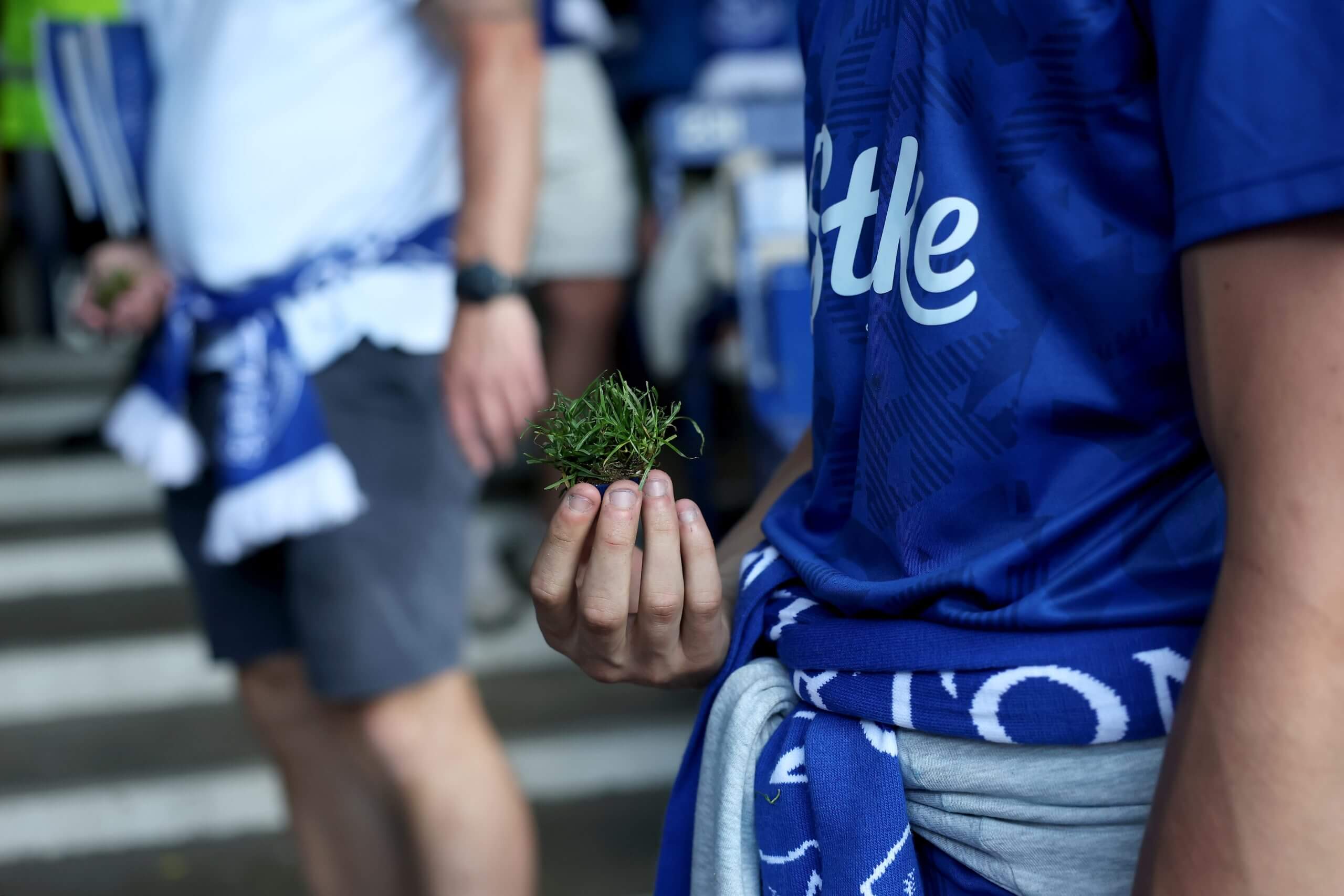
A fan taking a piece of the Goodison turf on Sunday (Carl Recine/Getty Images)
For some supporters, this is effectively sponsorship from one of their most significant former director’s companies. For others, the finances are the key consideration.
“Having a stadium sponsor is a necessary fact of modern football, so ‘officially’ naming it Bramley-Moore Dock Stadium, Dixie Stadium or anything else unsponsored would be throwing money away and we can’t afford to do that,” Nik R wrote on The Athletic’s discussion with Everton supporters. “Surely fans understand that.
“Holding out for an unreasonable figure is daft — it hasn’t done Spurs much good. They’ll struggle to get a better deal now, so we’ve done the right thing by finding a sponsor early and at what looks like a competitive rate. Plus they are local — I like that; and I’m told they have decent values — I like that too.”
Good company, good deal, bad name is the consensus. Most fans accept two out of three. But does the Hill Dickinson name actually matter? Back on the Gwladys Street, a family stop to chat.
Advertisement
“We recognise Dickinson Hill,” says Steven Baker, with his son David and daughter Ashley. “They’ve helped pay for it, and the new ground is fantastic. It’s on the banks of the royal blue Mersey, the stands are incredible and you can see it from miles away.
“But everyone will continue to call it the Bramley-Moore. And if we want something else? We’ll remember a legend — and call it the Hill Dixie.”
(Top photo: The new stadium with Hill Dickinson branding on; Everton FC)


